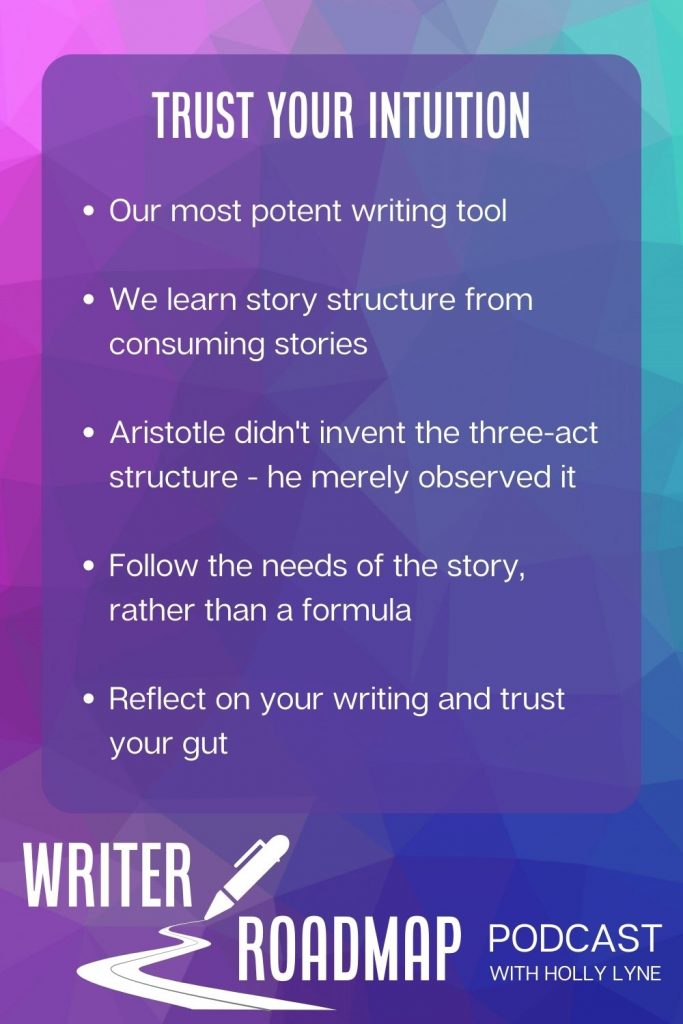Episode 006 – Writer Intuition
In today’s episode, we’re talking about that crucial tool in our writer toolkit: intuition.
Answer our question of the week in the comments section below. How easy do you find it to follow your intuition?
I have a book recommendation for you this week. Check out Dear Writer, Are You Intuitive? by Becca Syme and Susan Bischoff.

Transcript
Hello Navigators. Welcome to Writer Roadmap, the podcast for writers seeking inspiration, guidance, and support on their creative journey. I’m your host, Holly Lyne, and in today’s episode, we are focusing on a crucial, yet often overlooked part of the creative process: intuition.
Writers, we’re an interesting bunch. We surround ourselves with manuals, guides, classes, all in a bid to perfect our craft. We study plot structures, character development, grammar and style. But sometimes we overlook one of our most potent tools: our intuition.
Intuition is that gut feeling you get when a sentence just flows, when a character springs to life, when a plot twist feels deliciously unexpected yet utterly inevitable. But harnessing this tool is no easy feat because it comes without instructions. It’s unique to each one of us, and it requires trust.
Trusting your intuition doesn’t mean we disregard the skills we’ve painstakingly learned. It doesn’t mean we throw out the rule book and write with wild abandon, though there is a time and a place for that, too. Instead, consider your intuition as a compass. It’s there to guide you through the sprawling wilderness of your story, helping you navigate the path that feels most authentic to you.
Now, you might be wondering, how can we cultivate this elusive tool? The answer lies in our love for stories. Every book you read, every movie you watch, every story you consume helps shape and refine your intuition. It’s through immersing ourselves in a multitude of narratives that we develop a gut sense for what works and what doesn’t.
It’s in those moments when a character seems to leap off the page, when a turn of phrase perfectly captures the scene you’ve imagined. That’s your intuition at work, helping you find your unique voice. And remember, no one else can tell your story the way you can.
But how do we learn to trust this intuition? Here are a few tips:
First, practice mindful writing. Pay attention to how you feel as you write. Are you excited? Are you bored? Your emotional response is often a powerful indicator of what’s working in your story and what isn’t.
Second, allow yourself to make mistakes. Remember, not everything you write has to be perfect. Sometimes, it’s through exploring the wrong path that we find the right one.
And third, engage in regular reflection. Take some time to look back on your writing, to identify which parts felt most authentic to you. This will help you tune into your intuition and understand its language.
Whether you’re an outliner or a discovery writer, there is a huge amount of intuition in the writing process. We can become convinced that there is some sort of formula to writing a book that sells. While, to an extent that may be true in some genres, particularly romance, there is so much room for play and experimentation. Try not to get locked into following a set structure guide. While things like Save the Cat or the Hero’s Journey can provide a framework for us to refer to, we shouldn’t slavishly follow it. It’s important to let the story flow in a way that feels natural and authentic. The needs of the story always come first.
Remember that the very first story structures were discovered, not invented. People were doing them anyway. When Aristotle unveiled the three-act structure, he didn’t come up with the idea, it was already there. No one had made it a rule, no one had dictated that was how plays had to be written. They just did. It was natural. It was intuitive.
Story structures are deeply embedded into our subconscious, so relax and trust that your imagination knows what to do.
So, as we wrap up today’s exploration of intuition, remember that this is one of the most powerful tools in your writer’s toolbox. Lean into it, trust it, let it guide you through your creative process. It might not always lead where you expect, but it will invariably lead you to a story that feels true to you.
I’d love to hear your thoughts. How easy do you find it to follow your intuition? Let me know in the Q&A on Spotify, or on this episode’s post on Instagram. Just follow me @hblyne for all things Writer Roadmap.
Thank you for listening and happy planning.
Writer Roadmap intro and outro music used under license from Pixabay. Music track “Salangseuleoun” was Created by “Dayfox”.
*Affiliate links may be included. You never pay more, but I may make a small commission on your purchase. This helps to pay for the running of this site.
Leave a Reply